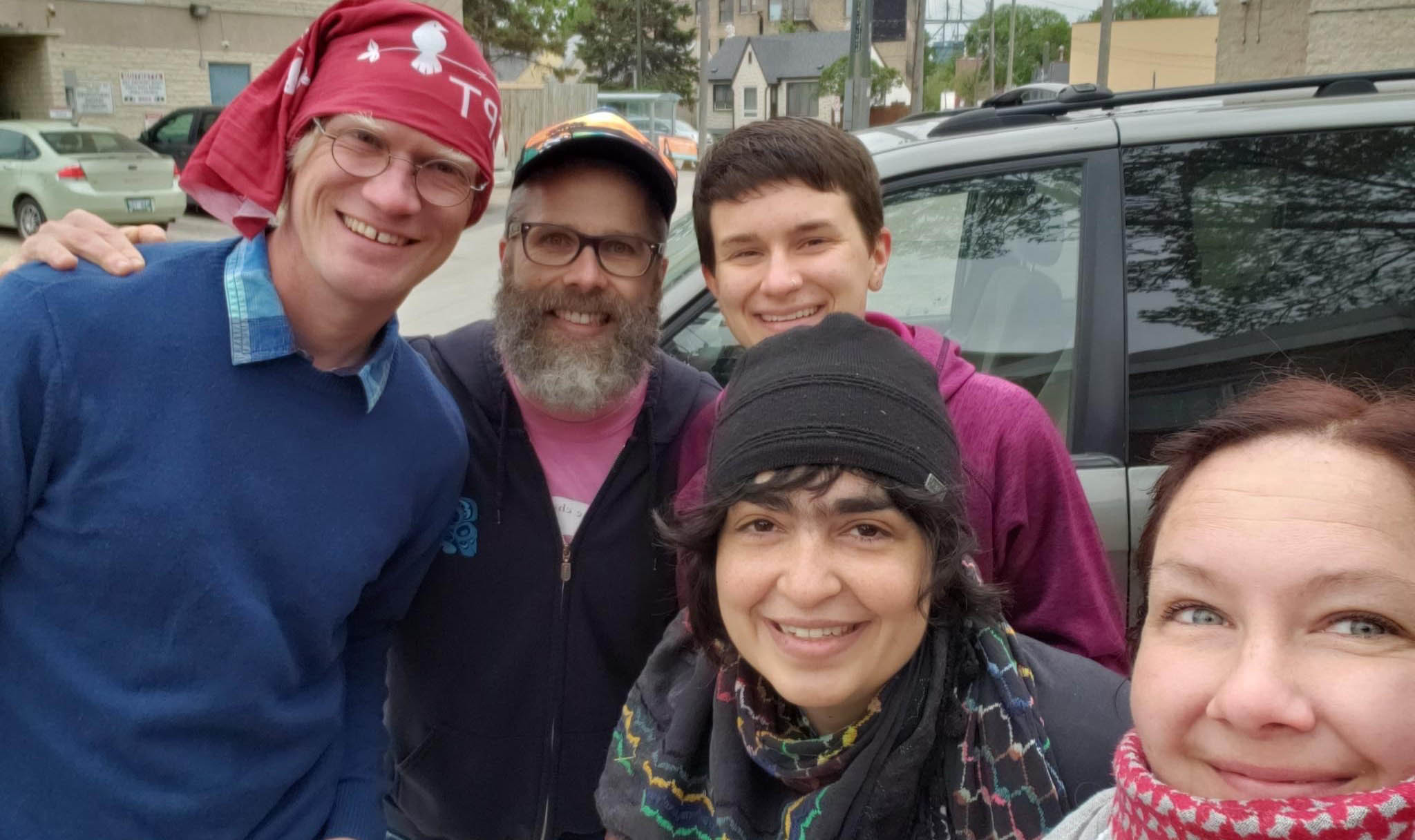May 28th, 2021“Listening and learning as guests on Wet’suwet’en territory”
an interview with two team members from the Mennonite Church Canada and Christian Peacemaker Teams accompaniment team at Unist’to’ten

Team members (L-R): (Back row) Josiah Neufeld, Steve Heinrichs, Allegra Friesen Epp; (front) Emily Green and Rachelle Friesen.
Christian Peacemaker Teams and Mennonite Church Canada have responded to an invitation to accompany Unist’ot’en Camp in Wet’suwet’en Territory (see www.unistoten.camp). While many communities and workplaces have been in a form of lockdown for over a year, work on the Coastal GasLink pipeline has not stopped, and has increased in recent weeks. Some First Nations groups along the pipeline route support the project, including 20 band councils that have signed mutual benefit agreements with Coastal Gaslink. But others are strongly opposed, including the Wet'suwet'en Hereditary Chiefs who are responsible for governance of ancestral lands under Wet’suwet’en law. The Hereditary Chiefs were the plaintiffs in the landmark 1997 Delgamuukw-Gisday’way v. British Columbia Supreme Court of Canada decision, which recognized that Aboriginal title has not been extinguished in the 58,000 square kilometers claimed by the Gitxsan and Wet’suwe’ten.
Five members of CPT and Mennonite Church Canada will be joining Unist’ot’en Camp for approximately one month to learn from the people, listen to the land and support the protection and maintenance of the Healing Centre, which, for over 12 years, nurtures connections to traditional territories and waters, cultural and spiritual wellness, and ensures Indigenous presence on sovereign territory.
Team members Allegra Friesen Epp and Emily Green answer questions about this trip.
Please describe your role on this trip and your relationship to Mennonite Church Canada and CPT.
Allegra Friesen Epp: I am visiting Unist’ot’en as part of my internship with Mennonite Church Canada and Christian Peacemaker Teams’ Turtle Island Solidarity Network. Over the last number of months, I have been doing Indigenous solidarity work with both organizations. I am also attend Home Street Mennonite Church in Winnipeg. I first became involved in CPT’s work on a delegation to Colombia in 2019.
Emily Green: I am a reservist with CPT. This means that I have completed their one-month intensive training and I am available to work or volunteer with their projects. I am also a member of the Undoing Oppressions Working Group where we examine CPT policies and aspire to improve their anti-oppression practices.
Tell us about where you’re travelling. Where is Unist’ot’ten and who lives there?
AFE: Our delegation is going to the Wet’suwet’en nation, which is located in what is now known as northwestern B.C. All 22,000 square kilometers of Wet’suwet’en territory remain unceded, which means that the Wet’suwet’en have never given up title to their lands.
The Unist’ot’en are one of five Wet’suwet’en clans. They established Unist’ot’en Camp in 2010 as a place of cultural resurgence and connection to their territory. We will be staying at this camp, which the Unist’ot’en maintain year-round.
EG: The territory is the site of a land defense struggle: the Wet’suwet’en people are resisting a pipeline project that would threaten their river and watershed—and their way of living and being. I am learning to appreciate my relationships with non-human life as just as real and important as my human relationships. The territory is inhabited by many living beings including bears, wolves, moose, elk and deer; there are also cedar, spruce, fir and many other species of tree.
Why are you visiting this community?
AFE: Our delegation is responding to Unist’ot’en’s request for on-the-ground support. It is essential that, as settlers, we embody our solidarity and take seriously the invitation to be present on the frontlines. Christ paid particular attention to those who were being oppressed by the colonial powers of his time. As a Christian, I believe I am called to do the same.
EG: I had the honour of visiting just over a year ago, before the pandemic. I’m hopeful that I will reconnect with old friends and make new friends. Relationship-building is foundational to settler-Indigenous solidarity. It gives me life to envision a decolonized world and it gives me hope to engage in Indigenous-led strategies to build that world.
What will you do when you are there?
AFE: We will take direction from the Unist’ot’en leadership and lend a hand wherever needed. This might include chopping firewood, washing dishes or documenting human-rights violations. We intend to do lots of listening and learning as guests on Wet’suwet’en territory.
EG: I’ll do what is needed: cooking large meals, helping with construction projects or any number of other tasks. Our accompaniment group has plans to read about settler-Indigenous solidarity and to learn together.
How can we learn more about this community and support the work that you’re doing?
AFE: There are several great videos on the Unist’ot’en Camp website that beautifully illustrate the values and vision of the community. This 3-minute video describes the Healing Centre at Unist’ot’en, which provides the community with cultural programming and land-based teachings.
The Unist’ot’en need financial support. Donations made here go towards legal costs associated with the Unist’ot’en’s ongoing protection of their lands, rights and way of life.
EG: For a short, 20-minute background on the struggle, I recommend watching the video Invasion.
Read the May 28 statement from the Mennonite Church Canada-CPT delegation here.